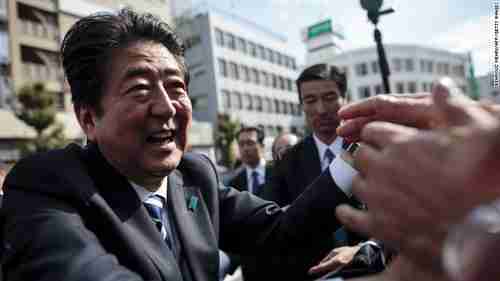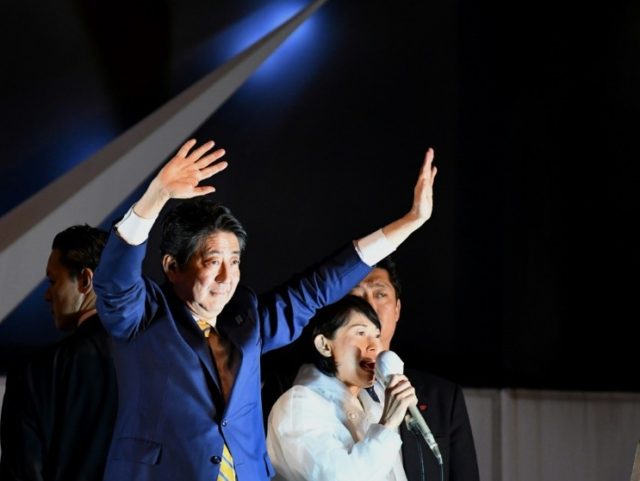This morning’s key headlines from GenerationalDynamics.com
- Japan’s Shinzo Abe wins a ‘super-majority’ in Japan’s lower house
- Abe promises to change the constitution to end Japan’s pacifism
Japan’s Shinzo Abe wins a ‘super-majority’ in Japan’s lower house

Japan’s Shinzo Abe campaigning (CNN)
Japan’s Liberal Democratic Party (LDP), led by prime minister Shinzo Abe, won a landslide victory in a snap election on Sunday, reaching a two-thirds “super-majority” in the lower house of Japan’s parliament.
When Abe called for the snap election last month, many analysts considered it a high-risk gamble because his approval rating had been falling. (When Britain’s Theresa May called for a similar UK election this year, the result was political disaster).
Abe’s opponents accused him of calling the snap election to create a distraction from the corruption scandal he was facing, based on accusations that he had used his influence as prime minister to help a private university and an ultra-nationalist school in their business deals with the government.
Whatever the motivation, the gamble seems to have paid off in a big way. Abe denied that the scandals had anything to do with these actions. Instead, he took a nationalistic stance against North Korea’s growing belligerence and threats. North Korea launched two ballistic missile tests, on August 28 and September 14, respectively, with the missiles flying over Japanese airspace.
On Saturday, Abe said to supporters:
We can no longer let ourselves be fooled by North Korea. We cannot succumb to its threats. By taking advantage of our strong diplomacy, we have to make sure the North will have no other option but change its policy and return to the negotiating table.
Abe has also gained popularity by “Abenomics,” a combination of generous government spending and central bank monetary easing.
The landslide win makes it likely that Abe, who took office in December 2012, will next year win a third three-year term as LDP leader and prime minister. Japan Times and BBC
Abe promises to change the constitution to end Japan’s pacifism
Prior to Sunday’s election, Shinzo Abe’s LDP was able to muster a two-thirds “super-majority,” when combined with its coalition partner Komeito. If the final vote count goes as expected, then the LDP will have a super-majority by itself in the lower house, though a coalition will still be required in the upper house. A two-thirds majority is required to amend the constitution.
Abe has said repeatedly that he’d like to amend the constitution to repeal Article 9, which says:
CHAPTER II – RENUNCIATION OF WAR
Article 9. Aspiring sincerely to an international peace based on justice and order, the Japanese people forever renounce war as a sovereign right of the nation and the threat or use of force as means of settling international disputes.
In order to accomplish the aim of the preceding paragraph, land, sea, and air forces, as well as other war potential, will never be maintained. The right of belligerency of the state will not be recognized.
Japan actually has very powerful land, sea, and air forces, arguably in violation of Article 9. But they have never fired a shot at an enemy. They are known as “Self-Defense Forces” (SDF), and are currently forbidden from participating in any military action except on Japanese soil in case of foreign attack.
In 2015, Abe was able to get the parliament to reinterpret the self-defense clause to mean “collective self-defense.” Under this interpretation, military action would be permitted anywhere in the world when an ally (such as the United States) is attacked. I discussed the meaning of “collective self-defense” in detail in 2014 in “5-May-2014 World View — Japan debates ‘collective self-defense’ to protect America and Japan”.
A lot of international media discussions of the election are blaming Article 9 on the United States, for imposing it on Japan at the end of World War II. It is true that American General Douglas MacArthur did require the self-defense clause to be included in Japan’s post-war constitution, but that was 70 years ago. Japan could have amended its constitution at many points in the last seven decades, but chose not to. The self-defense clause has been very popular, not only because many people believe that it makes war less likely, but also because the Japanese people save a lot of money by just leaving it to the United States to provide military protection. Even the reinterpretation as “collective self-defense” was and is highly controversial.
For Shinzo Abe, amending Article 9 is personal, in that he is following in the path of his grandfather, Kishi Nobusuke, who served as prime minister of Japan from 1957-60. Kishi disliked the pacifism clause because it made Japan too dependent on the United States, and he wanted Japan to be completely self-reliant in national defense. For Abe, amending this clause would fulfill his grandfather’s wish.
This year, in a statement commemorating the 70th anniversary of the constitution, Abe set a 2020 deadline for amending the constitution:
I believe that we must establish the status of the SDF explicitly in the constitution during our generation’s lifetime and leave no room for contending the SDF could be unconstitutional. I strongly wish to make 2020 the year that the reborn Japan will make a new start.
Ironically, it has been belligerent actions by China and North Korea that may have made it possible for Abe to get the constitution amended. In particular, the people of Japan (and South Korea) are no longer as certain as they were in the past that the United States would protect them. But with the United States increasingly concerned about protecting itself, Japan and South Korea are both now looking for ways to increase their own military capabilities, and not have to depend on the US as much. With the Japanese people becoming increasingly anxious, Abe may succeed in getting the constitution amended by 2020, despite the fierce opposition. Kyodo News and NBC News and South China Morning Post and CNN
Related Articles
- North Korea crisis: Would the United States sacrifice Los Angeles for Seoul? (18-Oct-2017)
- Japan’s election opens the way to repeal ‘pacifism’ constitution clause (12-Jul-2016)
- Russia and Japan fail to agree on ending World War II (17-Dec-2016)
- Japan and Russia may settle post-World War II Kuril Islands dispute (03-Sep-2016)
- Japan’s election opens the way to repeal ‘pacifism’ constitution clause (12-Jul-2016)
- Japanese warships visit Vietnam, as China moves warplanes into South China Sea (14-Apr-2016)
KEYS: Generational Dynamics, Japan, Shinzo Abe, Abenomics, Liberal Democratic Party, LDP, North Korea, China, Self-defense forces, SDF, Article 9, Collective self-defense, Douglas MacArthur, Kishi Nobusuke, South Korea
Permanent web link to this article
Receive daily World View columns by e-mail

COMMENTS
Please let us know if you're having issues with commenting.